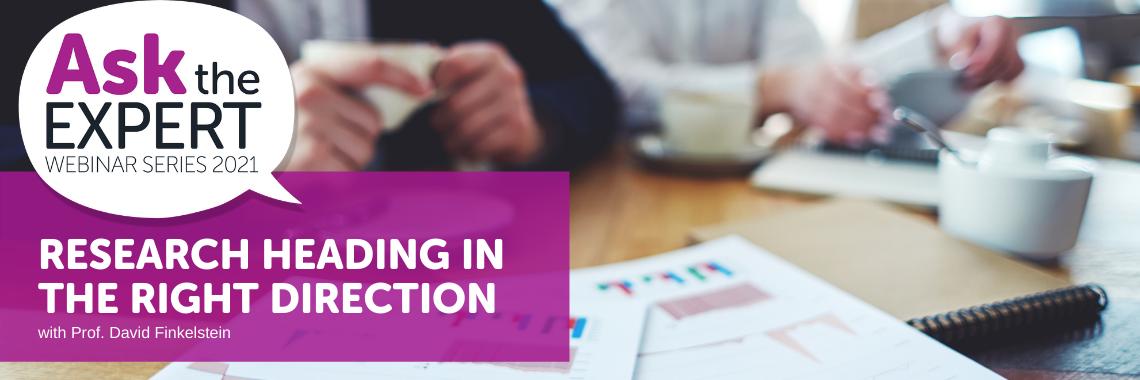Research heading in the right direction
Early identification of disease, complementary and stem cell therapies, COVID-19 and clinical trials were some of the topics discussed during the first Ask the Expert series with Prof. David Finkelstein, head of the Parkinson’s Disease Research Laboratory at the Florey Institute.
The relaxed conversational format also allowed for people to submit questions and have them answered in real time, providing a unique opportunity to engage with a renowned research scientist committed to improving the lives of people with Parkinson’s now and into the future.
Prof. Finkelstein spoke about the hope he has for early identification of Parkinson’s.
“The problem is we currently diagnose late and it’s much harder to put the brakes on something that is well-advanced than to stop it early in the course of progression,” he said.
With further research centering on compounds with the potential to halve the rate of Parkinson’s, we have to get better at diagnosing Parkinson’s, something Prof. Finkelstein admitted was a major challenge for clinical scientists.
He explained that up to 30% of people initially diagnosed with Parkinson’s were later found not to have it. Those carrying out clinical trials needed 100% of their participants to have Parkinson’s, which means the 30% potentially incorrectly diagnosed had to be excluded or the drug trial may fail.
“And this is the impasse,” Prof Finkelstein said.
“There’s scientists all over the world now trying to diagnose Parkinson’s and they think that they can diagnose Parkinson’s 10 years before neurologists do so today. So there are important advances taking place, but they’re slow and need to be accepted by clinicians across the globe.”
This can be the difficulty with Parkinson’s – researching Parkinson’s treatments may extend over an extended period due to slow progression of the condition, which is very different to measuring the potency of vaccine or developing blood pressure medication with immediate effects.
“But that’s not to say people aren’t currently getting the best treatment that’s available in the world. In fact, we’re very lucky in Australia that anything your doctors think is safe and would help is available to them,” Prof. Finkelstein said.
“And we’re realising it’s not just medications that improve the quality of life. It’s not one tablet, there’ll never be one solution. You have to look after your diet, you have to exercise, these things we know have improved quality of life and decreased injuries in people with Parkinson’s. They’re simple, they’re cheap, but they weren’t known five years ago.”
However, he also warned people to be careful of alternative ‘treatments’ with no scientific evidence to back them up and for which large amounts of money have to be paid for, including going overseas for STEM cell therapy.
“This is one of the future therapies I think will be there to offer people in the future but it’s not there yet. There are stories of people paying hundreds of thousands of dollars for STEM cells. If you are in a legitimate clinical trial, your expenses are often covered but importantly there’ll be no costs.”
Prof. Finkelstein also touched on COVID-19 and the impact on people with Parkinson’s.
“The good news is that for people with Parkinson’s there does not seem to be an increased rate of getting COVID. However, I am concerned about young people getting COVID because there seems to be a syndrome afterwards in which you get changes in the brain and some of them look like Parkinson’s.”
So, what will be the next big research finding in Parkinson’s?
“I think it’ll be in diagnosis. What I would love to happen at the age of 50 is that, like you get a bowel cancer test in the mail, I can see a time in the not too distant future that people will get a brain health kit.
“So I’m hoping there’ll be more of a concept of prevention than treatment. Not that I’m going to leave people out who need treatment, but it’s easier to prevent than to fix something.”
Prof. Finkelstein cited a research paper that analysed computermouse movements and millions of clicks by people using a computer search engine that found correlation between tremorrelated
searches and people experiencing tremor.
“There’s all these concepts, things we are using such as Fitbits, that we haven’t thought of as being integral to measuring our health (in terms of data collection and measurement). This is a brave, world and new world, an exciting world that’s coming about.
“We are better understanding the biology of Parkinson’s. So studies where patients donate blood or have an eye test, which do the patient no harm, help research and help us understand Parkinson’s much better than we did five years ago or 10 years ago. And that’s how we’re making advances.
“So, yes please participate in clinical trials but be discerning and look after yourself. Ask what people are going to do to you and what will be gained from this. Talk to your doctor and your family so you are giving informed consent.”
